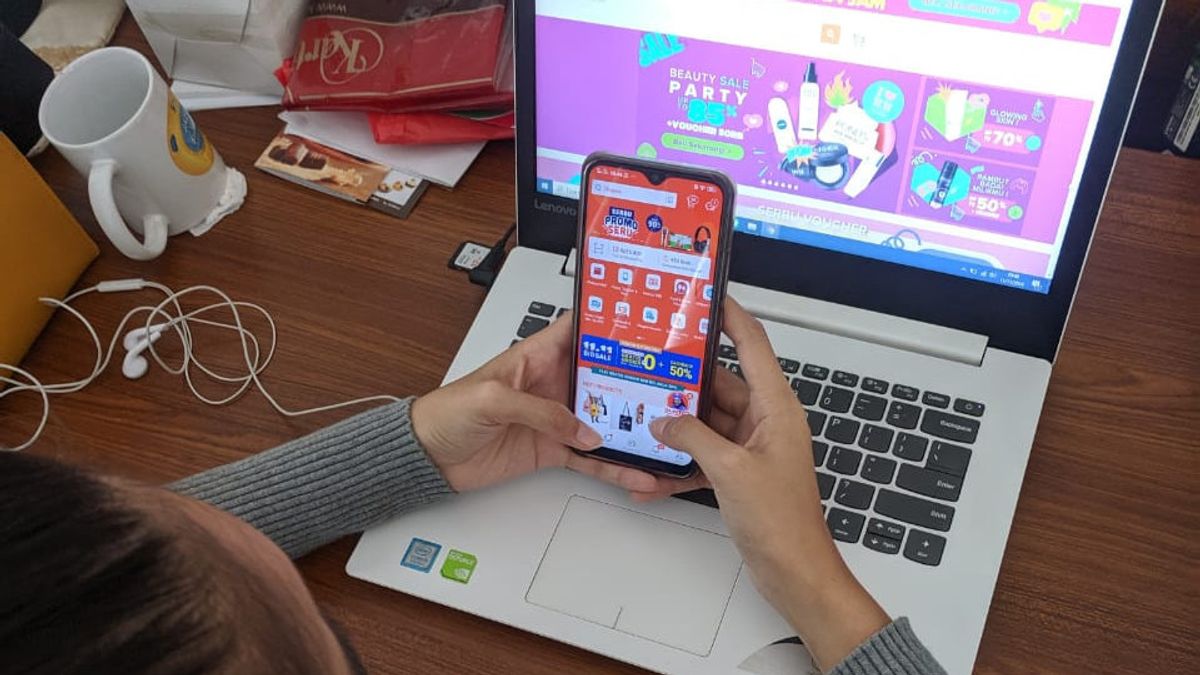JAKARTA - National Online Shopping Day or Harbolnas, was held again. E-commerce stores and online shopping platforms have also distributed discounts, promos and cash back to their users.
This often leads to impulsive shopping behavior for potential customers. Not only seeing abundant discounts, but also nominal cash back or a modern term that refers to virtual refunds of the value of goods purchased.
Reporting from Forbes, in a study conducted by digital marketing company Razorfish in a number of countries, it shows the consumptive behavior of people when buying goods from online stores. The result was that 1,680 people who were questioned showed a happy attitude when they received notifications regarding certain offers.
'Digital dopamine' as stated, Michael Fishman, a consumer behavior expert, states that consumer psychology is directed to make purchases of goods when they see certain offers, without having clear reasons and needs.
"Most people can not answer simple questions about why they want the things they are," said Fishman as written by Forbes.
Michael also revealed that the hedonic appeal of the appearance of online shopping sites by displaying promos and offers of low prices also provokes consumptive behavior from buyers. The negative opium from online shopping like this is what you need to watch out for, by buying things only as needed.
Chairman of the Daily Executive of the Indonesian Consumers Foundation (YLKI) Tulus Abadi also appealed to the public not to become entangled with consumptive behavior during Harbolnas - November 11 and December 12.
He said, online shopping behavior is increasingly loved by the community, especially among the millennial young generation. Cheaper prices are the main consideration, especially since they are still being lured by discounts, cash back, pay later, and others.
"First, consumers still have to prioritize critical and rational shopping behavior. Shop based on need not desire. Don't get caught in the seduction of discounts, because many discounts are just marketing gimmicks, aka fake discounts," he said as quoted from his statement, Monday, November 11.
In addition, Tulus reminded consumers to pay more attention to all forms of discounts that were given, including the types of items that were discounted. Don't get caught up in the seduction of discounts, because many discounts are just a marketing gimmick, aka fake discounts.
"Do not let consumers be harmed by online shopping transactions from market places that are not credible. Instead, consumers are deceived," he added.
Because, based on YLKI complaint data for the last 5 years, online shopping complaints have always been ranked in the top three. "And ironically, the highest percentage of complaints experienced by consumers is that the goods do not reach the consumers. This means that there are still many problems in online shopping in terms of consumer protection," he added.
Therefore, Tulus urged the government to closely monitor online shopping practices, especially through the Ministry of Trade, Ministry of Communication and Information, the Financial Services Authority to the POM. This is because the growing phenomenon of online shopping is ironically not parallel to the strength of government oversight.
The more exciting it is, the more fun it is to start investing in Bukalapak! Come on, try investing with BukaReksa or BukaEmas and get a special 11% discount only on promo # As11k! Guaranteed Bukalapak #BikinAsik even while investing! Click https://t.co/3GKw7neUQx yes pic.twitter.com/k8U4Ip8IK7
- Bukalapak (@buk Bukalapak) November 11, 2019
Increase economic growth
Launching from CNBC Indonesia, the growth rate for the Gross Domestic Product (GDP) in 2018 increased the extraordinary transaction value, reaching IDR 6.8 trillion. This value is an increase of Rp 2.1 trillion from last year's transaction value.
"For this year we have earned IDR 6.8 trillion transactions. Although we are actually targeting IDR 7 trillion, this is also an increase of IDR 2.1 trillion from last year's transaction value," said the Head of Harbolnas 2018, as well as Country Head of Shopback Indonesia, Indra Yonathan to December 19 last year.
He said that of the total Rp. 6.8 trillion, 46% of which was contributed by local products. Where the transaction value earned Rp. 3.1 trillion. Based on research results from market research institutes, Nielsen Indonesia, the transaction value on the e-commerce platform increased by an average of 6.9 times compared to the daily average.
The products that are much sought after are fashion, beauty and travel. For local products, fashion products and family clothes are the prima donna, at 56 percent, followed by beauty products with around 26 percent and electronics for 16 percent.
The English, Chinese, Japanese, Arabic, and French versions are automatically generated by the AI. So there may still be inaccuracies in translating, please always see Indonesian as our main language. (system supported by DigitalSiber.id)













